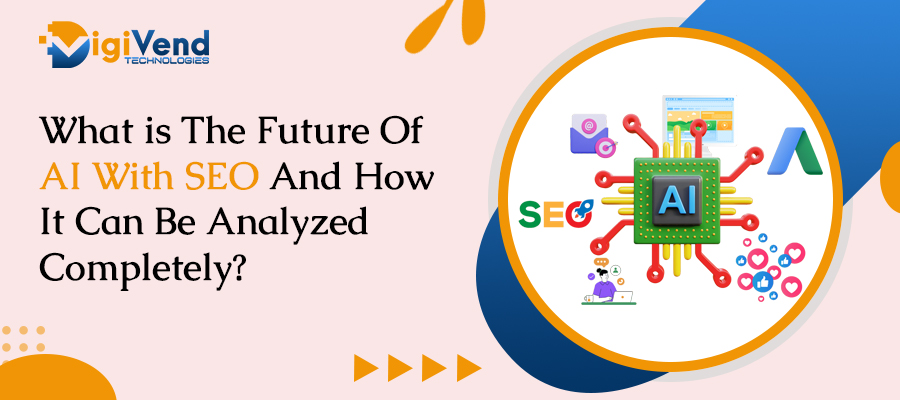As you all know many generative models of AI have been derived and some of them are GPT-4 and BERT.It is known that SEO is about to undergo a significant transformation. It is known that the GPT-4 model from Open AI has completely changed the field of Search Engine Optimization which makes them more dynamic than before.
On the other hand, the Google BERT algorithm has caused ripples in the SEO community because of its capacity to handle NLP requests that help in providing accurate search results. It is undeniable that SEO will keep evolving in the future and it will become more popular with these advancements in artificial intelligence technology.
This onsite blog will discuss the impact of AI on SEO in the upcoming years. Regardless of any business, this will help you know how AI is changing SEO in various ways. Many of the marketers are curious to know if AI could take away their jobs.
In what ways AI is changing SEO?
With the help of AI technologies, the efficiency of SEO services in India has been increased greatly as it enables marketers to see a dramatic shift in SEO techniques enabling search engine algorithms to handle large numbers of data and find the purpose behind those user queries. Some of the ways AI is changing SEO are as follows:
1. AI-Powered Keyword Research: It is known that AI significantly improves SEO by removing manual tasks and expediting keyword research. It improves semantic relationships, precisely optimises keywords, and produces thoughts tailored to a certain niche with the help of technologies like ChatGPT. Developing SEO strategies that work, also helps in analysing the intent of the users. By generating more natural traffic for their websites, this automation helps marketers stay one step ahead of their rivals.
2. Content Optimization with AI: Search engines like Google know AI-generated content since it can be difficult to guarantee human-quality standards. AI helps with idea generation and content optimization, but it cannot completely replace human content creators. AI is used by marketers to create social media posts, meta descriptions, and title tags. It also analyses highly-ranked pages to determine optimization tactics that will raise search engine rankings.
3. Voice search optimization with AI: Artificial Intelligence uses machine learning and natural language processing to replicate human speech patterns and optimise data for voice searches. Nowadays there is a growing popularity of voice assistants like Siri, Alexa, and Google Assistant, and search engine optimization for speech queries is crucial. It has driven solutions which help them evaluate search terms and help companies understand user intent for better content creation. Additionally, AI recognizes queries that are associated with goal keywords and long-tail keywords, which helps with content optimization for increased exposure in voice search results.
4. Enhanced user experience: Better Understanding of Search Intent: To provide interesting content that improves user engagement and SEO, AI examines user behaviour, preferences, and trends. By lowering bounce rates and increasing website performance, integrating chatbots driven by AI enhances the user experience. Search engines reward good user experiences, therefore artificial intelligence is essential to SEO tactics. To boost SEO performance, AI-based optimization focuses on user experience metrics including page load speed and interaction, which is in line with Google’s Core Web Vitals.
5. Predictive SEO: To foresee changes in user behaviour, search trends, and algorithm adjustments, predictive SEO makes use of proactive AI. It examines enormous data sets using machine learning techniques to find trends and forecast future-term popularity. This strategy makes use of ChatGPT and related models, which offer insights into user behaviour and assist marketers in finding new keywords for their content initiatives.
6. Visual search optimization: Most of the SEO agencies in India use artificial intelligence (AI) and deep learning, visual search optimization improves image recognition to help consumers locate relevant products on Google Lens and Pinterest Lens. By making shopping on e-commerce sites easier, this new SEO frontier optimises photos for increased prominence in visual search results.
7. Personalization: In search engine optimization, personalization is adjusting search results according to user behaviour, preferences, and geography. Nowadays AI-powered predictive analytics helps in maximising content distribution to increase user engagement and audience reach.
How will ChatGPT influence the development of upcoming SEO techniques?
ChatGPT plays a significant role in shaping future SEO strategies in many ways from providing insights to pertinent and engaging content for improved online exposure and search engine optimization. Some of the ways ChatGPT influence the development of SEO techniques are as follows:
- Keyword research and analysis:
The Natural Language Processing algorithms of ChatGPT offer a smooth keyword research and analysis experience. It improves SEO tactics and search engine rankings by producing pertinent long-tail keywords and phrases. For instance, a query for “digital marketing for lawyers” produced 30 useful keywords, demonstrating the applicability of ChatGPT in keyword research for various business sectors.
- Meta Title and Description Generation:
Through the creation of compelling meta titles and descriptions that grab users’ interest and improve search engine rankings, AI systems like ChatGPT revolutionise SEO. These AI-generated meta tags improve exposure on search engines by being both keyword- and content-relevant. However, post-generation optimization and manual evaluation are required.
- FAQ creation:
AI streamlines the creation process of FAQs, saving time and effort. It analyses user inquiries and provides targeted responses for FAQs with a long-tail keyword emphasis, thereby optimising the website and raising its search engine ranks. In addition, by giving prospective customers useful information, this procedure aids companies in remaining one step ahead of their rivals.
- Outreach email generation:
Email outreach is made easier by AI systems like ChatGPT, which provide interesting and tailored emails that increase traffic and links. These personalised emails encourage useful backlinks while saving time and effort.
- Composing and merging analytics reports:
Furthermore, ChatGPT streamlines the process and improves SEO by automating the creation of schema markup for websites. It suggests appropriate schema types for best outcomes and prompts for required information. Additionally, by analysing data, summarising insights, and automating tasks, ChatGPT helps with the creation and management of analytics reports, freeing up marketers to concentrate on data research and strategic decision-making.
Why is SEO not going anywhere?
Optimising your online content with the help of AI in SEO to increase its visibility in search engine results is the fundamental idea behind effective SEO, even though the strategies and tactics may vary in reaction to algorithm changes or new search capabilities. Because of its enduring significance, SEO is still relevant today. Some of the reasons why SEO will remain popular are as follows:
- Search engines always change: Some of the Search engines, such as Google, Bing, and Yahoo, are always updating their algorithms. By doing this they can deliver more accurate results, so businesses need to stay current with SEO tactics.
- User intent and experience: To increase exposure and organic traffic, organisations can improve user experience, design websites more beautifully, and provide relevant content by having a better understanding of user intent.
- Mobile dominance; Since most people access the internet through smartphones, mobile optimization is essential for SEO and has an impact on search engine rankings on platforms like Google.
- Content quality and relevance: Good and pertinent content is necessary to build brand identification, encourage user interaction, and engage users—all of which improve SEO.
- Local and voice search trends: The digital world is being shaped by trends in local search and voice search, thus SEO needs to adjust to natural language and local optimization.
- Growth of online competition: Businesses hoping to establish an online impact and attract new customers must invest in SEO Optimization Noida due to the intense competition in the online market as well as the rapid growth of e-commerce and digital marketing.
- Budget-Friendly Marketing: Small businesses can now compete on an even playing field because of SEO, which also increases online presence and brings in qualified traffic.
The role of artificial intelligence in defining search engine optimization will only grow in the future. From search patterns to delivering individualised results with unparalleled precision and accuracy all can be achieved when AI is integrated with SEO. AI can give a path but all these strategies will be created with a human mind.
FAQs:
Will SEO be replaced by AI?
AI won’t replace SEO, instead it will help in improving it. AI increases task automation, enhances keyword research, and optimised content. This helps in increasing the efficiency of SEO tactics.
Is Seo DEAD because of artificial intelligence?
AI has not killed SEO on the contrary, it has made it intelligent and data-driven, which has improved user experiences and produced better results.
What is the role of AI in SEO and how it will shape the future of digital marketing?
AI plays a big part in SEO since it improves user experiences, helps accelerate operations, and offers insights for improved optimization. These factors will drive the future of digital marketing toward more individualised and effective tactics.
 ISO 9001:2010
ISO 9001:2010 INDIA: +91 8447 380 102
INDIA: +91 8447 380 102 USA: +1 (321) 800-5881
USA: +1 (321) 800-5881







